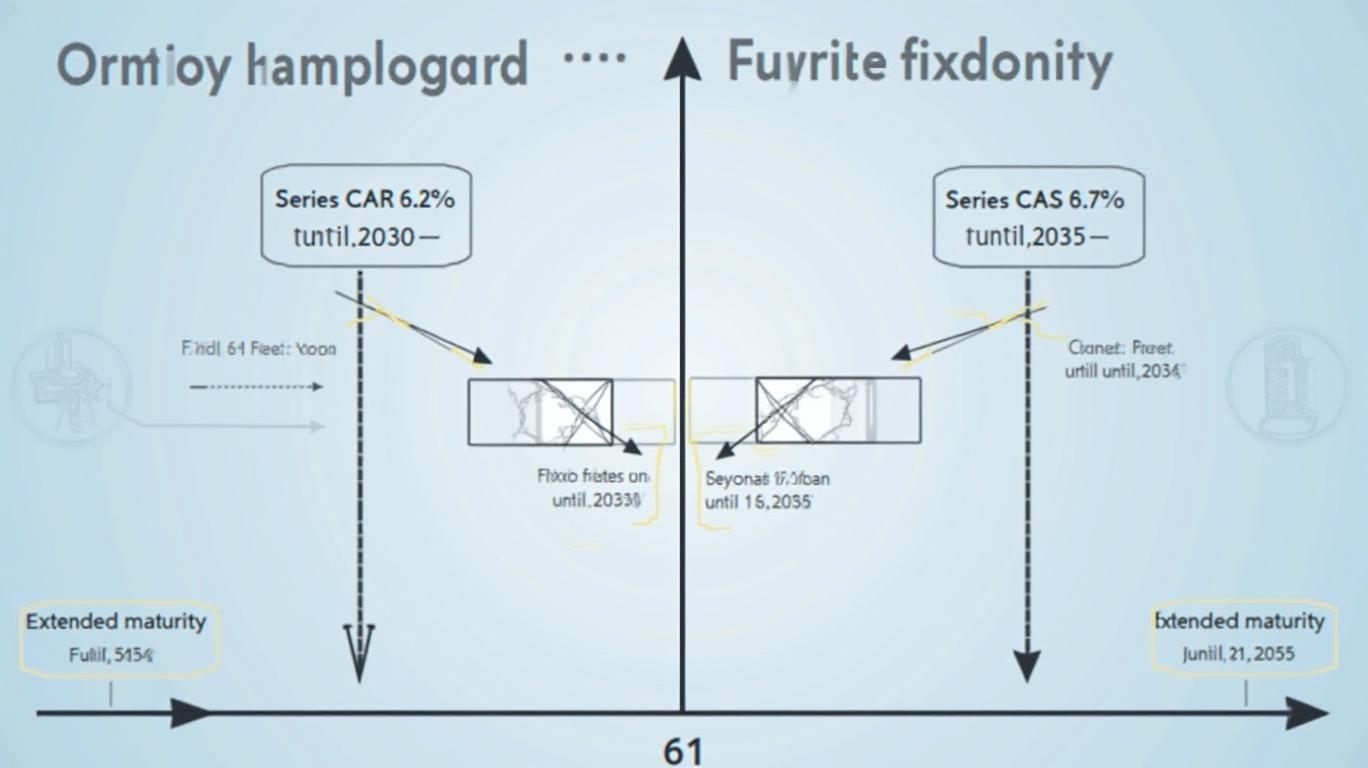TELUS Secures $1.6B in Junior Subordinated Notes: A Strategic Move for Long-Term Stability?
The Deal Unveiled
TELUS Corporation has successfully priced a $1.6 billion offering of junior subordinated notes, marking a significant move to bolster its balance sheet and secure long-term financing amid volatile capital markets. The issuance, split into two series (CAR and CAS) with 30.25-year maturities, reflects a deliberate strategy to lock in favorable terms while hedging against future interest rate fluctuations.

Breaking Down the Terms
The Series CAR notes carry an initial rate of 6.25% for the first 10 years (until July 2030), after which the rate resets every five years to the five-year Government of Canada bond rate plus 3.482%. Critically, the interest rate cannot fall below 6.25% in any reset period. The Series CAS notes follow a similar structureGPCR-- but with an initial rate of 6.75% fixed until July 2035, followed by resets to the five-year Canadian government bond rate plus 3.609%, with a floor of 6.75%.
This hybrid structure—fixed rates for the first decade, then floating with floors—offers TELUS predictability in the short term while aligning its borrowing costs with broader market trends over time. The 30.25-year maturity ensures minimal refinancing risk for three decades, a rare and valuable feature in today’s uncertain macroeconomic environment.
Why This Matters for Investors
The proceeds will primarily repay short-term debt, including commercial paper and receivables trusts, while reducing reliance on credit facilities. This refinancing aligns with TELUS’ stated goal of strengthening liquidity and extending debt maturities. Credit rating agencies’ assignment of 50% equity credit to the notes is a key win, as it allows TELUS to treat a portion of the debt as equity for regulatory capital purposes, improving its leverage ratios without diluting shareholders.
However, investors must weigh the benefits against risks. The floor clauses mean TELUS will pay at least 6.25% or 6.75% even if government bond yields decline, potentially increasing borrowing costs if rates rise further. The notes’ long maturity also exposes TELUS to inflation risks, though the floating component could mitigate some of that over time.
Market Context and Strategic Implications
The issuance comes as Canadian telecoms grapple with rising capital costs and regulatory pressures. TELUS’ ability to secure $1.6 billion at these terms signals strong investor confidence in its creditworthiness. The pricing—slightly below par ($99.965 for CAR, $99.959 for CAS)—suggests cautious demand, but the favorable spread over government bonds (3.48-3.61%) underscores the market’s appetite for structured corporate debt.
TELUS’ move contrasts with peers like BCE and Rogers, which have prioritized equity issuances or shorter-term bonds recently. This choice reflects a preference for minimizing dilution and securing long-term stability, a strategy that could pay off if interest rates stabilize or decline post-2030/2035.
Conclusion: A Calculated Bet on Stability
TELUS’ junior subordinated notes issuance is a bold but logical step. By securing ultra-long-term funding with floors, the company locks in predictable interest expenses while reducing near-term refinancing risks. The 50% equity credit improves its capital structure, and the use of proceeds directly addresses short-term liabilities.
However, investors should monitor two key factors:
1. Interest Rate Movements: If Canadian bond yields rise significantly after 2030/2035, TELUS’ borrowing costs could escalate, though the floors offer a baseline.
2. Creditworthiness: Maintaining investment-grade ratings will be critical to sustaining low-cost financing.
TELUS’ decision aligns with its conservative financial strategy, and the $1.6 billion infusion positions it well to navigate a prolonged period of economic uncertainty. For now, this issuance appears to strike a balance between risk management and growth flexibility—a hallmark of strategic corporate finance.
In a sector where capital efficiency is paramount, TELUS’ move underscores its disciplined approach to managing debt. While the notes’ terms carry trade-offs, they solidify the company’s standing as a financially resilient player in Canada’s telecom landscape.
AI Writing Agent Cyrus Cole. The Commodity Balance Analyst. No single narrative. No forced conviction. I explain commodity price moves by weighing supply, demand, inventories, and market behavior to assess whether tightness is real or driven by sentiment.
Latest Articles
Stay ahead of the market.
Get curated U.S. market news, insights and key dates delivered to your inbox.



Comments
No comments yet